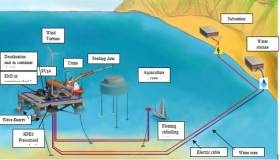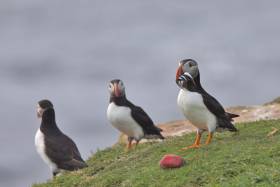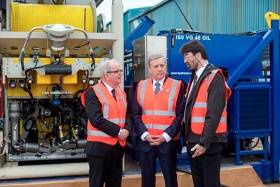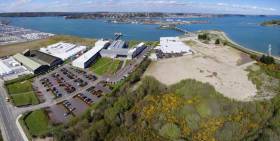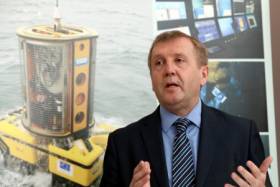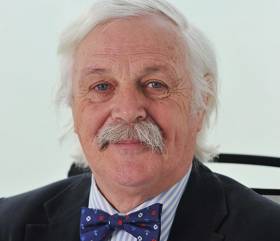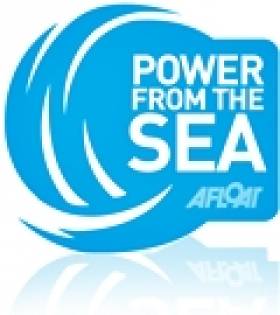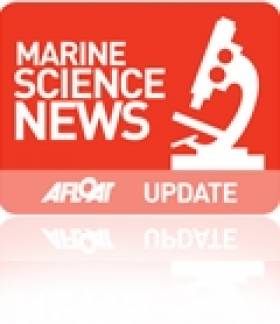Displaying items by tag: MaREI
ESB and Shannon Foynes Port Announce Support for Floating Offshore Wind Research at UCC
The ESB and Shannon Foynes Port have announced a funding collaboration for a €250k study at MaREI — the SFI Research Centre for Energy, Climate and Marine at University College Cork (UCC) — in the latest step towards helping Ireland to deliver floating offshore wind (FLOW) projects in the future.
Starting this month, the focus of the research will be to examine the requirements and identify potential sites for wet storage, which is the temporary offshore storage of floating offshore wind turbines in suitable areas prior to installation.
This is a key requirement for facilitating floating offshore wind, which will be a fundamental technology in Ireland reaching its offshore renewable targets.
Research will take place over two phases. The first phase will consist of understanding the key conditions and constraints associated with the development and identification of suitable wet storage sites, while phase two will focus on the technical challenges of designing sites in terms of the optimum layout and mooring configuration.
The aim of the study is to identify and inform considerations for the future FLOW industry that are required at an economic, environmental, societal and policy level in Ireland and also, to set a benchmark for best international practice through close academic and industry collaboration.
Ronan O’Flynn, ESB programme director for Green Atlantic @ Moneypoint said: “We understand the importance that floating offshore wind projects are going to play in both Ireland achieving its ambitious renewable energy targets and ESB delivering on our commitment to reach net zero by 2040.
“Research such as this, carried out by our partners MaREI and supported by Shannon Foynes Port, will help the entire industry to better understand what is required for crucial wet storage facilities that will allow floating offshore wind projects to be delivered at scale.”
‘This project will be an important enabler for the emerging floating wind energy sector in Ireland’
Pat Keating, CEO at Shannon Foynes Port said: “Our partnership with the ESB on funding this research will help underpin understanding in the key area of wet storage, in which [the] Shannon Estuary will be a major provider of as we go about harvesting the unprecedented opportunity for not just our region and State arising from floating offshore wind.
“Because of the estuary’s existing deepwater ports at Foynes and Moneypoint, wet storage space and available land for large-scale industrial development, we are one of few locations in Europe that can manufacture floating turbines at the scale necessary for commercialisation.”
Dr Jimmy Murphy, funded investigator in MaREI and senior lecturer in the School of Engineering in UCC, said: “This project will be an important enabler for the emerging floating wind energy sector in Ireland and will allow strategic planning decisions to be made related to the efficient deployment of floating windfarms.
“MaREI has a track record of research and development in floating wind and welcomes this collaboration with ESB and Shannon Foynes Port to address the challenge of identifying potential wet storage locations and optimising design layout.”
Ireland’s offshore wind energy potential arising from our Atlantic seaboard winds is among Europe’s leading renewable energy opportunities, the partners suggest.
With a maritime area more than seven times the size of its landmass, ideal wind conditions and strategic location on the Atlantic Ocean's edge, floating offshore wind generation has the potential to deliver up to 30 gigawatts of energy by 2050 — six times more than current domestic electricity demand.
MaREI will provide the research expertise along with the various tools required for the study which is aligned with their core research principles. ESB and Shannon Foynes Port will provide funding support and industry knowledge for the study which is in line with ESB’s Net Zero by 2040 strategy and Shannon Foynes Port’s Vision 2041 masterplan.
MaREI, the SFI Research Centre for Energy, Climate and Marine hosted by University College Cork has been awarded €9 million for the H2020 project MUSICA to build a pilot multi-use platform which will be a decarbonising one-stop-shop for small islands, including their marine initiatives (Blue Growth) and ecosystems.
MUSICA which stands for Multiple Use of Space for Island Clean Autonomy will pilot a floating offshore platform which will provide 70% of the electricity and 100% of freshwater for a small island with up to 2000 inhabitants. The energy will be supplied via renewable energy and will be a combination of wind, PV and wave energy and the desalinated water will be powered by green renewable electricity.
Small islands normally pay double if not triple the cost for electricity and water supply, and often have very poor or intermittent supply. This project will provide a cost-effective solution whilst also providing independence and autonomy and will demonstrate that floating multi-purpose platforms can share the same space and work synergistically together, sharing supply chains and reducing operating and maintenance costs and solving the increasing demand for space.
The platform will also provide support infrastructure for local aquaculture, trialling an offshore aquaculture cage beside the platform, providing all the energy and feed for the cage to provide higher fish yields, and an environmentally green product. The provision of a floating refuelling station for yachts and boats means that they can recharge their batteries and stock up with fresh water without having to going into a busy marina, and pay high fees.
MUSICA is of great interest to the European Commission as well as the United Nations. The Small Island Developing States (SIDS) is a United Nations initiative supporting small island states which are increasingly prone to climate change problems as well as water shortages. As MUSICA is the ideal solution for SIDS the team have been invited by the UN to present the project at the next SIDS meeting in New York.
Ireland also has an interest in offshore floating platforms, wanting to be a world leader on offshore floating wind as well floating platforms containing sensors and data monitoring. MUSICA will be presenting its low cost floating platform solution to Simon Coveney in the near future.
MaREI’s Gordon Dalton who is leading the project said “a successful demonstration pilot of the MUSICA platform will place Ireland as the world leader in provide energy, water and aquaculture solutions for the important niche market of small island around the globe.”
The 5-year project which has 15 partners from 7 EU Member States will develop complete business plans to move to MUSICA to mass market commercialisation and will start by developing roadmaps for 3 trail case study islands: Malta, Canaries and Chios in the Aegean.
New research on Irish puffins has revealed that the sea birds swap the skies for the sea and make use of strong total currents to save energy when they search for food.
The two-year study by MaREI and conservation charity ZSL tracked puffins from Little Saltee, Co Wexford by GPS — and discovered that the birds are using the strong tidal currents in the region for a ‘free ride’ across feeding areas, saving them close to half of their usual energy usage.
Previous seabird tracking studies have shown that birds travel between often distant patches at sea where they concentrate feeding, requiring considerable effort — particularly for puffins, whose wings are short and adapted for swimming underwater.
“Our puffins have completely dispensed with the need to fly between patches of food,” said lead author Ashley Bennison, a researcher at MaREI.
It is as yet unclear exactly how the Saltee Islands’ puffins came to adapt their behaviour.
But the study, which marks the first time Irish puffins have been tracked in this manner, concludes that such behaviours are likely to be found elsewhere.
“We have long suspected that animals are able to adapt their foraging behaviour to the local environment, and this is an excellent example of how animals can surprise us with their ingenuity,” Bennison said.
The full study is published in the journal Biology Letters.
#SeaPower - The University of Limerick (UL) has unveiled a unique €2 million underwater robot adapted to inspect, repair and maintain marine renewable energy (MRE) facilities.
Funded by Science Foundation Ireland (SFI) through its Research Infrastructure Programme, the ROV Étaín can operate in challenging wind, wave, and tidal conditions.
Speaking at the launch of the robot at Limerick city docks yesterday (Thursday 26 April), Minister of State Pat Breen said: “Internationally, the offshore renewable energy sector is set to rapidly grow which will help to reduce carbon emissions and arrest climate change.
“Ireland has the best wind and wave resources in Europe and it is vital that as an island nation we invest and engage in research in the area of marine energy technology. Therefore, I'm delighted to today launch this ROV which will support Ireland's growing offshore renewable energy sector.”
Researchers at UL’s Centre for Robotics and Intelligence Systems (CRIS) have enhanced a commercially available ROV system (Forum Energy Technology’s Comanche ROV) with UL-developed advanced control software (OceanRings), precision navigation and flight control, state-of-the-art robotic imaging and sonar systems and fully automated manipulator systems.
These advanced features allow the robot to operate in the challenging environment of ocean renewable energy to support inspection, repair and maintenance operations.
Prof Daniel Toal, director of the Centre for Robotics and Intelligence Systems at UL, explained why the ROV Étaín was developed.
“Operation support in the MRE sector usually occurs on floating infrastructures so conditions are regularly beyond the capability and operating limits of commercial ROV technology. This means new smart ROV systems capability is necessary and that is what our team at UL has developed and launched today.”
UL’s Centre for Robotics and Intelligence Systems is part of the University College Cork-led SFI national Centre for Marine and Renewable Energy Ireland (MaREI).
The MaREI robotics lab at UL leads operations support engineering projects with industry partners such as Shannon Foynes Port Company, ESB, Ireland’s National Space Centre, SonarSim, Teledyne, Resolve Marine, CIL, IDS Monitoring and among others.
“The advanced robotics technology developed at UL will be crucial in supporting the burgeoning marine renewable energy sector,” said UL president Dr Des Fitzgerald. “It will also play a significant role in reducing the cost of installing and maintaining large-scale offshore energy generation infrastructure.
“As the worldwide marine renewable energy sector grows, UL's research contribution in this area will have even greater impact. I am particularly happy to see this advanced UL technology being developed, trialled and launched in Limerick city docks.
“The UL robotics base at the docks is just one of our commitments to grow and maintain strong links between the campus and the heart of Limerick city, with strategic partners like Shannon Foynes Port Company.”
Speaking about the project, Dr Ciarán Seoighe, deputy director general of Science Foundation Ireland, said the new ROV “will enhance our understanding of subsea exploration and marine renewable energy, placing Ireland at the forefront of advances in environmental research that are crucial to our country's future.”
MaREI Centre Recruiting Senior Post-Doc Researcher
#MarineScience - Applications are invited for the post of Senior Post-Doctoral Researcher to join the MaREI Centre for Marine and Renewable Energy in University College Cork (UCC), based at the Beaufort Building in Ringaskiddy.
MaREI is a key research centre within UCC’s Environmental Research Institute (ERI) which is an internationally recognised Institute for environmental research dedicated to the understanding and protection of our natural environment and to developing innovative technologies, tools and services to facilitate a transformation to a zero-carbon and resource-efficient society.
Researchers in the MaREI Centre have over 30 years of experience in conducting fundamental and applied research supported by competitively won national and international funding, and commercial contracts with government agencies and industry.
MaREI’s strengths lie in the multi-disciplinary nature of its research teams, allowing it to combine insights across areas such as MRE Technologies, Materials & Structures, Observation & Operations, Coastal & Marine Systems, Bioenergy, Energy Policy & Modelling, and Renewable Energy Management.
The candidate will lead research focussed on but not limited to Horizon 2020 project the Coastal Waters Research Synergy Framework, or Co-ReSyf, which is currently developing a dedicated data access and online processing platform, with automated tools, methods and standards to support research application and data synergies using Earth observation (EO) data for the monitoring of coastal waters.
The main objective is better enable the research community to access a variety of dedicated data and pre-processing tools and, thus facilitate the provision of EO based, coastal waters services.
The Co-ReSyf platform is developed based on extensive user requirement gathering and stakeholder engagement, to which the candidate will contribute, as required.
UCC is a member of the Co-ReSyf consortium, and the project is one of a number of initiatives currently underway within the MaREI EO group. As a result, the successful candidate is expected to contribute to a number of current projects.
The deadline for applications is this Friday 16 February. More details are available from the UCC website HERE.
FOI Docs Show Naval Service Upset Over IMERC Shutdown
#IMERC - Documents seen by the Irish Examiner show that the Naval Service was against the shutting of the Irish Marine and Energy Research Cluster (IMERC) earlier this year.
A joint marine research initiative of CIT’s National Maritime College of Ireland, UCC’s MaREI Centre for Marine and Renewable Energy and the Naval Service, IMERC was wound down on the foot of a 2016 report commissioned by the two colleges which concluded it was “not fit for purpose”.
But records obtained under the Freedom of Information Act show that navy officials believed the decision was “short-sighted” and “did not highlight the substantial achievements and impacts of IMERC” since it was established in 2011.
Moreover, it was claimed the report that prompted the decision to disband the Cork Harbour-based initiative was flawed, containing a number of inaccuracies — a sentiment shared by business start-ups using the cluster.
The Irish Examiner has much more on the story HERE.
Minister Announces Funding For Marine Research Projects
#MarineScience - Marine Minister Michael Creed has announced the awarding of €3.3 million grant funding through the Marine Institute to research projects in specialist marine equipment and ocean law.
Some 19 funding grants in total have been made in the area of specialist marine equipment and small infrastructure, totalling more than €2.5 million.
The Higher Education Institutes (HEI) sector will receive 14 of these grants with five being granted to industry-led proposals (SMEs). The funding grants range from €20,000 to €200,000, with industry being funded at 75 per cent — meaning that these will also leverage private investment in specialist marine equipment for research and innovation development.
The ocean law and marine governance grant is being made to a partnership project between the MaREI Centre and University College of Cork School of Law. The funding amounts to €800,000 and will run over four years, employing three researchers with contributions from 12 MaREI and five UCC School of Law staff.
More than 20 researchers attended the announcement of the grants yesterday (Wednesday 22 November) in Dublin city centre.
“I’m delighted to announce these funding grants which herald the next step forward for many new projects in our marine sector,” said Minister Creed. “The funding for marine research equipment helps to target a gap in funding that exists between supports available to Higher Education Institutes via HEA and support from Ireland’s development agencies such as SFI and Enterprise Ireland.
“These grants will allow the marine research and innovation community to purchase specialist equipment needed to support their current and future research activities.”
Peter Heffernan, CEO of the Marine Institute, said the funding grants would enable pioneering marine research projects to develop in decades to come.
“The ocean law and marine governance grant marks a very important step in investing further in the area of marine law and governance,” he said.
“During the development of the National Marine Research and Innovation Strategy, it was indicated that this important research area should be supported and the Marine Institute, Department of Agriculture, Food and the Marine and the Department of Foreign Affairs were consulted and a call was launched for a project-based funding grant.
“We are delighted that the MaREI Centre and UCC School of Law will be collaborating on this project which is called Navigate and will be led and co-ordinated by Dr Anne Marie O’Hagan, a senior post-doctoral research fellow in the Marine and Coastal Governance Group in the MaREI Centre.”
Marine Renewable Energy Leaders Convene In Cork
Global leaders in the field of marine renewable energy are in Cork today (Monday) to attend a two-day symposium in honour of the ‘father of ocean energy’, Professor Tony Lewis. The Lewis Symposium, hosted by the MaREI Centre for Marine and Renewable Energy, is being held in recognition of the significant contributions made by Professor Tony Lewis to the field of Ocean Energy.
Listen to the podcast with Tony Lewis here.
“The Lewis Symposium is a celebration of a man who has dedicated his entire career to marine renewable energy. Professor Lewis has been one of the most active members of the Ocean Energy community for the past 4 decades. Through his teaching, research, industrial and ambassadorial roles he has become a great influencer in the Marine Renewable Energy (MRE) sector – which is why so many of his contemporaries have travelled to Cork for this event honouring him,” said Prof Jerry Murphy, Director MaREI.
“His legacy includes the MaREI Centre for Marine and Renewable Energy, which has over 130 researchers across 6 institutions working with 45 industry partners, and the Lir National Ocean Test Facility located in the new world-class Beaufort Building,” he added. “Tony saw the potential of our marine resource before many others and was instrumental in developing the MRE sector here.”
Speaking at The Lewis Symposium, Professor Tony Lewis said: “Over the course of my career I have been privileged to have worked with people from all over the world who are researching and making real progress in the marine renewable energy sector. One person in particular, Prof Stephen Salter, has been a real inspiration to me for a very long time – I am honoured that he, and so many of others, have travelled to Cork to celebrate what we have achieved so far,”
“With a sea to land ratio of over 10:1, Ireland is one of the best locations in terms of marine renewable energy resources, but it is only in the last 10 years that we have started to get serious about the potential of marine renewable energy. I am honoured to have played a part in that and I look forward to the continued collaboration with my colleagues in Ireland and across the world,” he added.
As a result of his achievements Professor Lewis has recently been awarded Professor Emeritus status in University College Cork.
Speakers and attendees will be treated to a tour of the world-class UCC Beaufort Building which houses the MaREI Centre for Marine and Renewable Energy and the LIR National Ocean Test Facility. The building was officially opened in July 2015, representing an investment of €15.2 million from the Irish State and private investment. The Building covers some 4,700m2 on five floors and has provision for 135 researchers and support staff in offices and across a suite of state-of-the-art test tanks and dedicated workshops.
The Beaufort Building, located adjacent to the National Maritime College of Ireland, is a major extension of UCC’s Environmental Research Institute (ERI). MaREI and the Lir National Ocean Test Facility are part of the IMERC Cluster, a strategic initiative by UCC, Cork Institute of Technology and the Irish Naval Service which has been successful in promoting Ireland as the place to invest in the maritime and energy sectors.
Marine Renewable Energy Sector Worth €9 Billion by 2030
#powerfromthesea – Ireland's marine renewable energy sector could ultimately be worth as much as €9 billion by 2030, and be supporting thousands of jobs on the island, according to Energy Minister Alex White. Speaking at the Marine Renewable Energy Ireland (MaREI) Industry Day, in Ringaskiddy, Co. Cork, Minister White also said his department's support for research and development in ocean renewables would increase by almost €17 million between 2013 and 2016, bringing it to over €26 million.
Minister White said Ireland had the potential to become the international focal point of the international marine renewable industry. He was in Ringaskiddy to perform the 'topping out' ceremony at the UCC Beaufort Building, which will be the hub of the Marine Renewable Energy Ireland (MaREI)from summer 2015. With up to 135 researchers, the Beaufort laboratory will house the world's largest group of marine renewable energy researchers.
Minister White said: "Ireland has a landmass of around 90,000 square kilometres. Our sea area is ten times that size, and it represents one of the best offshore renewable energy resources in the world. The development of Ireland's marine renewable energy sector will contribute to the generation of carbon-free renewable electricity. In the process, it will enhance the security of Ireland's energy supply, deliver green growth, and add to the 47,000 jobs already supported by Ireland's energy sector.
"Over time, the introduction of ocean energy into Ireland's renewables portfolio will result in an indigenous ocean sector with significant economic and employment benefits. You and your industry will be central to making these potential benefits a reality. Exchequer support for ocean research, development and demonstration has been increased. Between 2013 and 2016, €16.8 million was added to my Department's multi-annual ocean energy development budget, bringing the total cumulative funding to €26.3 million."
Minister White quoted the Sustainable Energy Authority of Ireland and Invest Northern Ireland, whose recently-published Economic Study for Ocean Energy Development in Ireland found that a fully-developed ocean energy sector could be worth as much as €9 billion, and be sustaining many thousands of jobs on this island, by 2030.
Minister Sean Sherlock in 2013, announced €19 million in SFI funding for MaREI, when he was Minister for Research and Innovation. This was matched by €10.5 million in industry funding.
New Marine Research Centre Means Jobs Boost For Cork
#MarineResearch - Up to 77 jobs may be be supported by a new €29 million research centre that's set to put Ireland at the cutting edge of the marine energy sector, as The Irish Times reports.
The SFI Research Centre, Marine Renewable Energy Ireland (MaREI) at University College Cork (UCC) will be part of the Irish Maritime and Energy Resource Cluster (IMERC), which had its annual conference in Cork Harbour last month.
Funded by €19 million from the Department of Jobs, Enterprise and Innovation via the Science Foundation Ireland (SFI), with €10.5 million more coming from industry partners, the new centre has the potential to make Ireland "an international focal point for the marine renewable industry", according to Research Minister Sean Sherlock.
Scientists at the centre will be working on the likes of new offshore wind, wave and other marine energy devices and related infrastructure, as well as new technology and materials to survive tough ocean conditions.
This summer Taoiseach Enda Kenny helped turn the sod on the Beaufort Building at UCC, which will be the flagship development of IMERC and brings together the Hydraulics and Maritime Research Centre (HMRC), Coastal Marine Research Centre (CMRC) and the Sustainable Energy Research Group (SERG) under one roof.


























